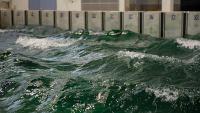-
U Wyoming could become cybersecurity hub

Wyoming Governor Matt Mead has requested state funding to develop a program at the University of Wyoming to become a center of excellence in cyber defense. According to the Wyoming Cybersecurity Education Initiative, proposed curriculum in the College of Engineering and Applied Science’s Department of Computer Science would educate students to defend against such attacks and “provide meaningful and sustainable impact to Wyoming’s technology sector through cybersecurity and information assurance higher-education programs.”
-
-
FBI investigates Kent State professor for ISIS connection
Julio Pino, an associate history professor at Kent State University, is currently under FBI and DHS investigation, which includes interviews with faculty members and students. Informed sources say that Pino has allegedly tried to recruit students to join ISIS.
-
-
U.S. science and technology leadership challenged by advances in Asia
According to the latest federal data, the U.S. science and engineering (S&E) enterprise still leads the world. The United States invests the most in research and development (R&D), produces the most advanced degrees in science and engineering and high-impact scientific publications, and remains the largest provider of information, financial, and business services. However, Southeast, South, and East Asia continue to rapidly ascend in many aspects of S&E. The region now accounts for 40 percent of global R&D, with China as the stand-out as it continues to strengthen its global S&E capacity. At the same time that China and South Korea have continued to increase their R&D investments, the United States’ longstanding commitment to federal government-funded R&D is wavering.
-
-
Professor fired for saying Muslims and Christians worship same God

Dr. Larycia Hawkins, a teacher of political science at Wheaton College in Illinois who has lost her job after claiming that Muslims and Christians worshipped the same God, has responded to her dismissal, saying she was “flummoxed and flabbergasted” by the decision to fire her. The college initiated termination proceedings, saying Hawkins had refused to take part in “clarifying conversations” about the theological issues raised by her comments.
-
-
U.K. university suspends Islamic society over hosting hate speakers

Queen Mary University of London has suspended the Islamic society at the university after the students’ union has launched an investigation into possible violations of protocols and procedures by the society. the society has been accused in the past of hosting events in which radical Islamist speakers, including speakers associated with Islamist fundamentalist groups. The U.K. government said that at least seventy events featuring hate speakers were held on U.K. campuses last year.
-
-
USD launches a new Center for Cyber Security Engineering and Technology

To address the threats cyberattacks pose to the security, prosperity, and privacy of the United States and its citizens, the University of San Diego announced the creation of its Center for Cyber Security Engineering and Technology. The Center will focus on cybersecurity challenges through education, training, and research.
-
-
U Maine launches center for studying, developing coastal and offshore structures

During a laboratory dedication on Monday at the University of Maine, the Harold Alfond Foundation announced a $3.9 million grant to the University of Maine to match $9.98 million already raised, formally establishing the Harold Alfond W2 Ocean Engineering Laboratory and Advanced Manufacturing Laboratory at the Advanced Structures and Composites Center on campus. The UMaine Composites Center is the largest STEM research and development program located in a Maine university, and is at the heart of one of UMaine’s seven Signature Areas of Excellence — Advanced Materials for Infrastructure and Energy.
-
-
DHS seeking faculty, students for summer 2016 research programs
The U.S. Department of Homeland Security (DHS) is seeking faculty, undergraduate, and graduate students interested in participating in one of its 10-week programs in summer 2016, including its Summer Research Team Program for Minority Serving Institutions and its Homeland Security — Science, Technology, Engineering and Mathematics (HS-STEM) Summer Internship Program. The deadlines for applying for both programs occur in December 2015.
-
-
NSF highlights more than forty years of supporting cybersecurity research and education

New report highlights NSF-funded cybersecurity research and education. Today, NSF invests nearly $160 million each year in interdisciplinary research, education, and workforce development help protect national and personal security. This support helps scientists develop the tools, training, and people that will keep the nation safe and maintain online privacy.
-
-
FBI delays release of interactive tool to identify violent extremists
Facing criticism, the FBI has decided to delay the release of “Don’t Be a Puppet,” an interactive program aiming to help teachers and students identify young people who show signs of flirting with radicalism and violent extremism. The program was scheduled for release Monday (yesterday). Civil rights advocates and American Muslim leaders, invited by the agency to preview the program, harshly criticized it for focusing almost exclusively on Islamic extremism. They noted that practically all the mass school shootings – and most of the violence perpetrated by extremists — in the United States had nothing to do with Islamic militants.
-
-
Identifying students cognitively equipped to succeed in cybersecurity
The University of Maryland Center for Advanced Study of Language (CASL) will partner with the U.S. Air Force to conduct a two-year study designed to advance the cyber workforce. The Air Force says that by assessing abilities rather than knowledge, it will broaden its cyber pipeline while improving outcomes and maintaining a highly skilled workforce.
-
-
Online residential fire simulation tool for training firefighters
Firefighting is not what it used to be. Whether it is a complex blaze raging in an urban high-rise or a seemingly straightforward single-level home fire, modern building construction and furnishings have made fighting fires more difficult: Flames burn hotter, produce more smoke, and spread more quickly. But fire research has advanced, too, and researchers are working with five major urban fire departments to build new knowledge on modern residential firefighting into game-based online simulations with an engaging, dynamic format.
-
-
Scholars challenge colleges to reform STEM learning
America’s colleges and universities need to transform not only how but what they teach in introductory science courses, a group of scholars say. The researchers say that college students are expected to learn too many facts that do not connect across their coursework or prepare them to apply scientific knowledge in their lives. They believe a different set of strategies taking hold in K-12 schools can be used to improve learning in science, technology, engineering, and mathematics, or STEM, during the first two years of college.
-
-
Experts are often fallible, so expert advice should be examined carefully
Evidence shows that experts are frequently fallible, say leading risk researchers, and policy makers should not act on expert advice without using rigorous methods that balance subjective distortions inherent in expert estimates. Many governments aspire to evidence-based policy, but the researchers say the evidence on experts themselves actually shows that they are highly susceptible to “subjective influences” — from individual values and mood, to whether they stand to gain or lose from a decision — and, while highly credible, experts often vastly overestimate their objectivity and the reliability of peers.
-
-
Math story time at home markedly improves math achievement in school

Adding math talk to story time at home is a winning equation for children’s math achievement, according to new research. The study shows a marked increase in math achievement among children whose families used Bedtime Math, an iPad app that delivers engaging math story problems for parents and children to solve together. A recent study found that math-anxious parents who help their children with math homework actually undermine their children’s math achievement – but the new findings demonstrate that structured, positive interactions around math at home can cut the link between parents’ uneasiness about math and children’s low math achievement.
-
- All
- Regional
- Water
- Biometrics
- Borders/Immig
- Business
- Cybersecurity
- Detection
- Disasters
- Government
- Infrastructure
- International
- Public health
- Public Safety
- Communication interoperabillity
- Emergency services
- Emergency medical services
- Fire
- First response
- IEDs
- Law Enforcement
- Law Enforcement Technology
- Military technology
- Nonlethal weapons
- Nuclear weapons
- Personal protection equipment
- Police
- Notification /alert systems
- Situational awareness
- Weapons systems
- Sci-Tech
- Sector Reports
- Surveillance
- Transportation
Advertising & Marketing: advertise@newswirepubs.com
Editorial: editor@newswirepubs.com
General: info@newswirepubs.com
2010-2011 © News Wire Publications, LLC News Wire Publications, LLC
220 Old Country Road | Suite 200 | Mineola | New York | 11501
Permissions and Policies
Editorial: editor@newswirepubs.com
General: info@newswirepubs.com
2010-2011 © News Wire Publications, LLC News Wire Publications, LLC
220 Old Country Road | Suite 200 | Mineola | New York | 11501
Permissions and Policies
